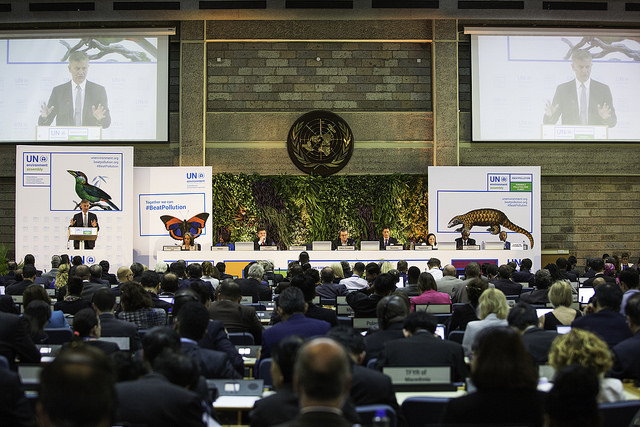
Chile, Oman, Sri Lanka and South Africa today joined UN Environment’s CleanSeas campaign against marine litter and ocean pollution, announcing measures including plastic bag bans, new marine reserves and drives to increase recycling.
The four countries announced their support during the UN Environment Assembly in Nairobi, Kenya.
The Assembly is expected to announce a raft of measures to counter pollution, in all its forms, which is killing millions of people around the world and eroding the natural systems on which all life depends.
“For too long, we have treated the ocean as a bottomless dumping ground for plastic, sewage and other waste,” said Erik Solheim, head of UN Environment.
“The countries supporting CleanSeas are showing the leadership we need in order to end this abuse, and protect the marine resources on which millions depend for their livelihoods.”
Minister of Environment for Sri Lanka, Anura Dissanayake, said, “Sri Lanka is taking bold action to turn the tide on plastics. We have banned plastic bags and are now working to reduce the number of plastic bottles in the country. We want to be a green and blue beacon of hope in Asia and do everything we can to keep the seas clean.”
Among the commitments made by the newest #CleanSeas members:
* Sri Lanka will implement a ban on single-use plastic products from 1 January 2018, step up the separation and recycling of waste, and set the goal of making its ocean and coasts “pollution-free” by 2030.
* Chile is legislating to extend producer responsibility and encourage recycling, and establishing more marine protected areas.
* Chilean cities are banning plastic bags in advance of a planned national ban.
* South Africa will step up its beach cleanup program and prioritize action on tyres, electronic waste, lighting and paper and packaging. This includes extended producer responsibility for plastic packaging.
Nearly 40 countries from Kenya to Canada and Indonesia to Brazil have joined the #CleanSeas campaign, which aims to counter the torrents of plastic trash that are degrading our oceans and endangering the life they sustain. The countries account for more than half of the world’s coastline.
Legislation to press companies and citizens to change their wasteful habits is often part of broader government strategies to foster responsible production and consumption – a key step in the global shift toward sustainable development.
The flow of pollution means detritus such as drinks bottles and flip-flops – as well as tiny plastic fragments, including microbeads used in cosmetics – are concentrating in the oceans and washing up on the most remote shorelines, from deserted Pacific islets to the Arctic Circle.
Humans have already dumped billions of tonnes of plastic, and we are adding it to the ocean at a rate of 8 million tonnes a year. As well as endangering fish, birds and other creatures who mistake it for food or become entangled in it, plastic waste has also entered the human food chain with health consequences that are not yet fully understood.
It also harms tourist destinations and provides breeding grounds for mosquitoes carrying diseases including dengue and Zika.
The #CleanSeas campaign aims to “turn the tide on plastic” by inspiring action from governments, businesses and individuals on ocean pollution.
Pollution is the theme of the 2017 United Nations Environment Assembly, which is meeting in Nairobi, Kenya from 4 to 6 December. All governments as well as individuals, businesses and other organizations are invited to sign the pledge and help #BeatPollution around the world.










